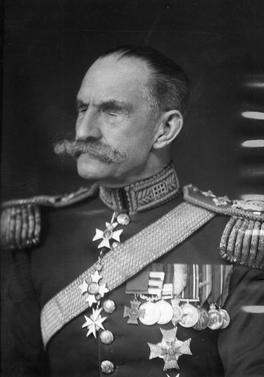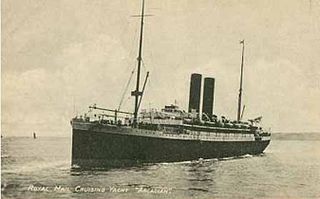
Guglielmo Giovanni Maria Marconi, 1st Marquis of Marconi was an Italian inventor and electrical engineer, known for his creation of a practical radio wave–based wireless telegraph system. This led to Marconi being credited as the inventor of radio, and he shared the 1909 Nobel Prize in Physics with Karl Ferdinand Braun "in recognition of their contributions to the development of wireless telegraphy".
1899 (MDCCCXCIX) was a common year starting on Sunday of the Gregorian calendar and a common year starting on Friday of the Julian calendar, the 1899th year of the Common Era (CE) and Anno Domini (AD) designations, the 899th year of the 2nd millennium, the 99th year of the 19th century, and the 10th and last year of the 1890s decade. As of the start of 1899, the Gregorian calendar was 12 days ahead of the Julian calendar, which remained in localized use until 1923.

The Second Boer War, also known as the Boer War, Anglo–Boer War, or South African War, was a conflict fought between the British Empire and the two Boer republics over the Empire's influence in Southern Africa.

Sir Ernest Beachcroft Beckwith Towse, was an English British Army officer and campaigner for the blind. He was a recipient of the Victoria Cross, the highest and most prestigious award for gallantry in the face of the enemy that can be awarded to British and Commonwealth forces.

The siege of Ladysmith was a protracted engagement in the Second Boer War, taking place between 2 November 1899 and 28 February 1900 at Ladysmith, Natal.
The following lists events that happened during 1900 in Australia.
Events from the year 1901 in the United Kingdom. This year marks the transition from the Victorian to the Edwardian era, with the death of the 81-year-old Queen and the accession of her 59-year-old son.
Events from the year 1900 in the United Kingdom.
SS Fazilka was a British India Steam Navigation Company (BI) steamship. She was built in England in 1890, operated mostly in the Indian Ocean, and was wrecked in the Nicobar Islands in 1919. She was a troop ship in the Second Boer War and the First World War. From 1901 to 1907 she took Indian indentured labourers to Fiji.
SS Fultala was a British India Steam Navigation Company (BI) steamship. She was built in England in 1890, operated mostly in the Indian Ocean, and was scrapped in India in 1923. She was a troop ship in the Second Boer War and the First World War. From 1901 to 1906 she took Indian indentured labourers to Fiji.
Events from the year 1896 in the United Kingdom.
Events from the year 1889 in the United Kingdom.

SS Potsdam was a steam ocean liner that was launched in Germany in 1899 for Holland America Line. In 1915 Swedish American Line acquired her and renamed her Stockholm.
SS Montrose was a British merchant steamship that was built in 1897 and wrecked in 1914. She was built as a cargo liner for Elder, Dempster & Company. In 1903 the Canadian Pacific Railway bought her and had her converted into a passenger liner.

Lieutenant-General Sir William Penn Symons KCB was a British Army officer who was mortally wounded as he commanded his forces at the Battle of Talana Hill during the Second Boer War. While his forces won the battle, they had to abandon their position and fall back to Ladysmith. Symons and the more severely wounded were left to the Boers; he died three days later as a prisoner of war. A monument to his valour was raised in Victoria Park, Saltash, Cornwall, UK.

SS Persic was an ocean liner of the White Star Line, built by Harland and Wolff in 1899. She was one of the five Jubilee-class ships built specifically to service the Liverpool–Cape Town–Sydney route. The voyage took six weeks.

SS Arcadian was an ocean liner launched in Barrow-in-Furness in 1899 by Vickers, Sons & Maxim Ltd for the Pacific Steam Navigation Company as Ortona. She was renamed Arcadian when the Royal Mail Steam Packet Company acquired her in 1906. She was chartered for the Royal Navy in 1915, and was sunk by a U-boat in 1917.
The history of broadcasting in Australia has been shaped for over a century by the problem of communication across long distances, coupled with a strong base in a wealthy society with a deep taste for aural communications in a silent landscape. Australia developed its own system, through its own engineers, manufacturers, retailers, newspapers, entertainment services, and news agencies. The government set up the first radio system, and business interests marginalized the hobbyists and amateurs. The Labor Party was especially interested in radio because it allowed them to bypass the newspapers, which were mostly controlled by the opposition. Both parties agreed on the need for a national system, and in 1932 set up the Australian Broadcasting Commission, as a government agency that was largely separate from political interference.
Henry Walter Jenvey was a senior public servant, initially with the Victorian Post Office and following Federation, the federal Postmaster-General's Department. He was heavily involved in the development of Victoria's telegraphy and telephony networks, and subsequently their integration into those of the Commonwealth. One of Australia's earliest wireless experimenters, he could reasonably be described as Australia's first amateur radio operator, since the majority of his experiments was self-funded and in his private time.
George Phillip Stevens was a senior public servant, transitioning from the State Post and Telegraph Department to the Federal Department following Federation. In later years he was secretary of the State Civil Service Association. But he was best known for having conducted the earliest wireless experiments in the State of Western Australia.







